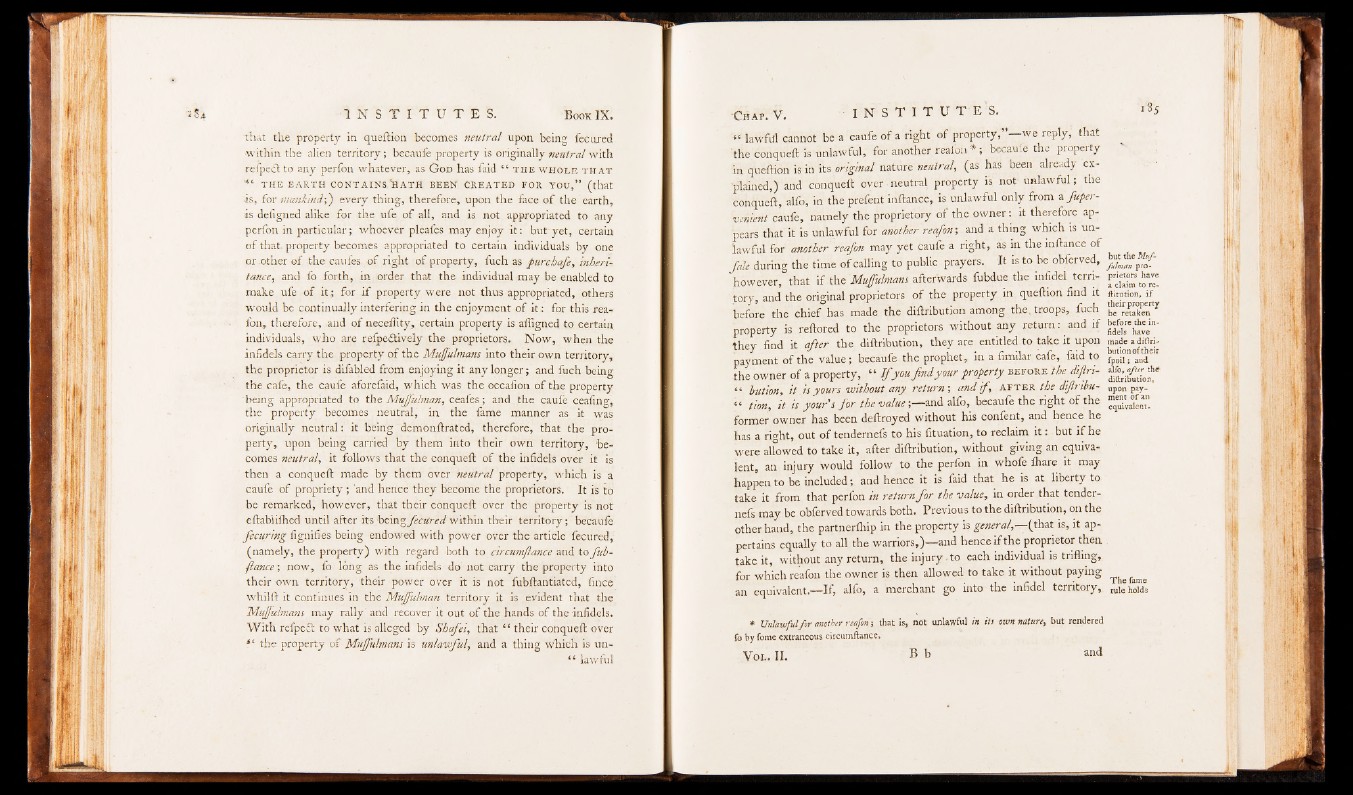
that the property in queftion becomes neutral upon being fecured
within the alien territory; becaufe property is originally neutral with
refpedt to any perfon whatever, as G o d has faid “ t h e w h o l e t h a t
T H E E A R T H C O N T A IN S , "H a t h B E E H C R E A T E D F O R Y O U , ” (that
is, for mankind;^ evexy thing, therefore, upon the face of the earth,
is defigned alike for the ufe of all, and is not appropriated to any
perfon in particular; whoever pleafes may enjoy it: but-yet, certain
of that, property becomes appropriated to certain individuals by one
or .other of the caufes of right of property, fuch as purchcfe, inheritance',
and fo forth, in order that the individual may be enabled to
make ufe of it; for i f property were not thus appropriated, others
would be continually interfering in the enjoyment o f it ; for this reafon,
therefore, .and of neceffity, certain property is affigned to certain
individuals, who are relpeftively the proprietors. Now, when the
infidels carry the property of the Mujfulmans into their own territory,
the proprietor is difabled from enjoying it any longer; and inch being
the cafe, the caufe aforelaid, which was the occafion of the property
being appropriated to the Muffulman, ceafes; and , the caufe ceafinc,
the property becomes neutral, in the fame manner as it was
originally neutral: it being demonftrated, therefore, that the property,
upon being carried by them into their own territory, becomes
neutral, it follows that the conqueft of the infidels over it is
then a conqueft made by them over neutral property, which is a
caufe of propriety; and hence they become the proprietors. It is to
be remarked, however, that their conqueft over the property is not
eftabiilhed until after it-s being fecured within their territory; becaufe
fecuring fignifies being endowed with power over the article fecured;
(namely, the property) with regard both to circumftance and to fub-
ftance; now', fo long as the infidels do not carry the property into
their own territory, their power over it is not fubftantiated, fince
whilft it continues in the Muffulman territory it is.evident that the
Mujjulmans may rally' and recover it out of the hands' of th.e infidels.
With refpedt to what is alleged by Shafei, that “ their conqueft over
J‘ the property of Mujfulmans is unlawful, and a thing which is un-
“ lawful
“ lawfill cannot be a caufe of a right of property,” we reply, that
the conqueft is unlawful, for another reafon*; becaufe the property
in queftion is in its original nature neutral, (as has been already explained,)
and conqueft over neutral property is not unlawful; the
conqueft, alfo, in the prefent inftance, is unlawful only from a Supervenient
caufe, namely the proprietory of the owner: it therefore appears
that it is unlawful for another reafon; and a thing which is unlawful
for another reafon may yet caufe a right, as in the inftance of
fale during the time of calling to public prayers. It is to be obferved,
however, that if the Mujfulmans afterwards fubdue the infidel tern-
tory, and the original proprietors of the property in queftion find it ftjtotion, if
before the chief has made the diftribution among the, troops, fuch retaken
property is reftored to the proprietors without any return: _ and if '
they find it after the diftribution, they are entitled to take it upon Ig g f fiK jj
payment of the value; becaufe the prophet, in a fimilar cafe, faid to
the owner of a property, “ I f you find your property b e f o r e Ihe diflri-
“ button, it is yours without any return; and if, a f t e r the diftribu- upon pay-
“ tion, it is your s for the value-,— and alfo, becaufe the right of the ™njVak“
former owner has been deftroyed without his confent, and hence he
has a right, out of tendernefs to his fituation, to reclaim i t : but if he
were allowed to take it, after diftribution, without giving an equivalent,
an injury would follow to the perfon in whole lhare it may
happen to be included; and hence it is faid that he is at liberty to
take it from that perfon in return fo r the value, in order that tendernefs
may be obferved towards both. Previous to the diftribution, on the
other hand, the partnerlhip in the property is general,— (that is, it appertains
equally to all the warriors,)— and hence if the proprietor then
take it, without any return, the injury, to each individual is trifling,
for which reafon the owner is then allowed to take it without paying T]ieJ.ame
an equivalent.— If, alfo, a merchant go into the infidel territory, ru;e holds
* U n la w fu lfa r a n o th er rea fo n ■ , that is, not unlawful in it s ow n n a tu r e , but rendered
fo by fome extraneous circumftance,
V ol. II. B b and